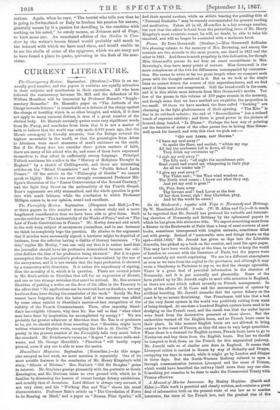The Fortnightly Review. September. (Chapman and Hall.)—Two or three papers
in this number deserve a calmer study and a more lengthened consideration than we have been able to give them. Such are the articles on "The Authenticity of the Works of Plato," and on " The Law of Trade Combinations in France." Mr. Morley does not add much to the well worn subject of anonymous journalism, and in one instance we think he completely begs the question. He alludes to the argument that if articles were necessarily signed, a barrister might be deprived of business, from the solicitor having a dislike of literary barristers. "To this," replies Mr. Morley, " one can only say that it is rather hard that the journalist should have his profession demoralized because the soli- citor dislikes the idea of his profession being elevated." But it is a pure assumption that the journalist's profession is demoralized by the use of the anonymous, and it is not certain that the legal profession is elevated by a connection with literature. It is rather the expediency of signing, than the morality of it, which is in question. There are several points in Mr. Rae's article on Sheridan that call for an expression of dissent, and one or two strange mistakes that must be noticed. Mr. Rae accuses Sheridan of putting a notice on the door of his office in the Treasury to the effect that " No applications can be received here on Sundays, nor any business done here during the remainder of the week." Surely Mr. Rae cannot have forgotten that the latter half of the sentence was added by some other satirist to Sheridan's matter-of-fact recognition of the validity of the Fourth Commandment. Then, after exposing Sheri- dan's incorrigible idleness, why does Mr. Rae tell us that "what other men have done by inspiration, he accomplished by energy ? " We are probably far greater admirers of Sheridan than Mr. Rae is or professes to be, yet we should shrink from asserting that " Sheridan might have written whatever Dryden wrote, excepting the Ode to St. Cecilia." The poetry in the present number of the Fortnightly falls very much below the standard. Mr. Swinburne's verses on "Regret " are mere milk-and- water, and Mr. George Meredith's " Phaethon " will hardly repay perusal, even if any one is able to scan the metre.






























 Previous page
Previous page